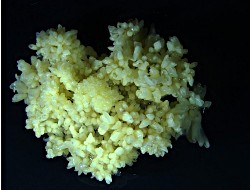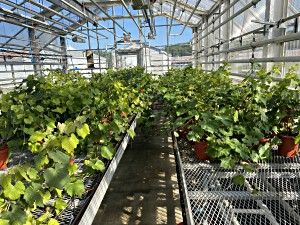
PRINCESS ANNE, MD-(July 22, 2021)-Grapes are among the most valuable fruit crops in the U.S. with 6.8 million tons produced annually on one million acres. In Maryland, 1,000 acres are dispersed between 89 licensed wineries. Grapes are also among the most heavily sprayed agricultural crops to combat diseases that account for more than 30% of the production costs and pose a challenge to growers along the Eastern Seaboard, including Maryland.
Dr. Sadanand Dhekney, an associate professor of plant breeding and biotechnology at the University of Maryland Eastern Shore, will lead a project supported by a recent $500,000 United States Department of Agriculture, capacity building grant to improve powdery mildew resistance in grapevine cultivars using genome editing technology.
Dhekney has worked for more than 15 years on developing precision breeding technology to improve grapevine tolerance to biotic and abiotic stress factors. His previous work included improving powdery mildew resistance using endogenous genes from wild grape varieties. He has now expanded his research to develop grapevine genome editing techniques using CRISPR/Cas9 and hopes to utilize it for improving disease resistance.
“Grape production is affected worldwide by powdery mildew, one of the most costly diseases to control in the crop,” Dhekney said. “Therefore, the development of mildew resistant grape cultivars have the potential to decrease grape production costs, while also helping to mitigate adverse human health and environmental effects.”
The three-year capacity building grant will allow Dhekney to develop the advanced crop technique widely used in field crops for applications in fruit crops.
“Genome editing enables modification of only specific traits in plants while leaving existing desirable traits intact,” Dhekney said. “This makes it possible to improve disease resistance of existing elite wine and table grape cultivars that have been grown for several hundred years.”

Dhekney maintains a greenhouse collection of more than 100 different grape cultivars that he will plant in a research field plot for breeding and the development of new cultivars. He has also established a biotechnology research laboratory where he trains students in cutting-edge crop improvement technologies such as genome editing and precision breeding to provide students with valuable skills and make them competitive in emerging job markets.
The project, “Improving Grapevine Resistance to Powdery Mildew Utilizing Genome Editing Technology,” is supported by USDA, NIFA grant #2021-38821-34513.
Gail Stephens, agricultural communications, University of Maryland Eastern Shore, School of Agricultural and Natural Sciences, gcstephens@umes.edu, 410-621-3850.
Photos courtesy of Dr. Sadanand Dhekney, associate professor, University of Maryland Eastern Shore, School of Agricultural and Natural Sciences, sdhekney@umes.edu,

